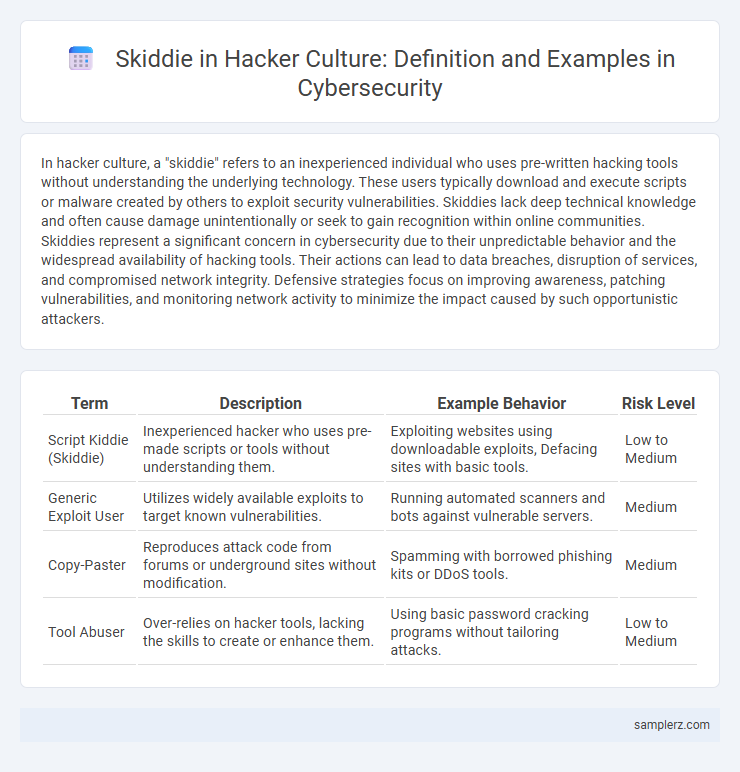In hacker culture, a "skiddie" refers to an inexperienced individual who uses pre-written hacking tools without understanding the underlying technology. These users typically download and execute scripts or malware created by others to exploit security vulnerabilities. Skiddies lack deep technical knowledge and often cause damage unintentionally or seek to gain recognition within online communities. Skiddies represent a significant concern in cybersecurity due to their unpredictable behavior and the widespread availability of hacking tools. Their actions can lead to data breaches, disruption of services, and compromised network integrity. Defensive strategies focus on improving awareness, patching vulnerabilities, and monitoring network activity to minimize the impact caused by such opportunistic attackers.
Table of Comparison
| Term | Description | Example Behavior | Risk Level |
|---|---|---|---|
| Script Kiddie (Skiddie) | Inexperienced hacker who uses pre-made scripts or tools without understanding them. | Exploiting websites using downloadable exploits, Defacing sites with basic tools. | Low to Medium |
| Generic Exploit User | Utilizes widely available exploits to target known vulnerabilities. | Running automated scanners and bots against vulnerable servers. | Medium |
| Copy-Paster | Reproduces attack code from forums or underground sites without modification. | Spamming with borrowed phishing kits or DDoS tools. | Medium |
| Tool Abuser | Over-relies on hacker tools, lacking the skills to create or enhance them. | Using basic password cracking programs without tailoring attacks. | Low to Medium |
Defining Skiddie in Hacker Culture
A skiddie, or script kiddie, in hacker culture refers to an inexperienced individual who uses pre-written hacking tools and scripts without fully understanding the underlying techniques or code. These hackers lack deep technical knowledge and rely heavily on publicly available exploits to breach systems or disrupt services. Their actions often result in low-level cyberattacks, which pose limited but urgent security threats to organizations and individuals.
Origins of the Skiddie Phenomenon
The skiddie phenomenon in hacker culture originated from inexperienced individuals who relied heavily on pre-written scripts or tools to exploit vulnerabilities without understanding the underlying mechanics. This subculture emerged prominently in the late 1990s and early 2000s as internet access became widespread, allowing novices to engage in hacking activities with minimal technical knowledge. Over time, skiddies have been identified by their use of common hacking kits and a lack of originality, contrasting with more skilled hackers who develop custom exploits.
Characteristics of Skiddies
Skiddies, or script kiddies, exhibit limited technical skills and rely heavily on pre-written hacking tools and scripts rather than developing their own exploits. Their activities often involve basic attacks such as website defacement, simple denial-of-service (DoS) attacks, and automated scanning for vulnerabilities without deep understanding of underlying systems. This lack of originality and expertise makes skiddies less sophisticated but still capable of causing harm through widespread, opportunistic cyberattacks.
Common Tactics Used by Skiddies
Skiddies, or script kiddies, commonly exploit pre-made tools like automated vulnerability scanners and brute-force password crackers to infiltrate systems. They often rely on publicly available exploits and distribute malware through phishing emails or fake software downloads. Their tactics prioritize ease and speed over stealth or sophistication, targeting easily exploitable security weaknesses in networks and websites.
Skiddie Exploits: Real-World Examples
Skiddie exploits often involve the use of pre-made scripts and tools to launch DDoS attacks, deface websites, or execute simple SQL injections without deep technical knowledge. Notable real-world examples include the Mirai botnet attack in 2016, where relatively inexperienced hackers used readily available malware to compromise IoT devices, causing massive internet outages. These incidents highlight how skiddies leverage existing vulnerabilities and exploit kits rather than developing sophisticated custom exploits.
Impact of Skiddies on Cybersecurity
Skiddies, or script kiddies, exploit pre-made hacking tools without deep technical knowledge, leading to widespread low-level cyber attacks such as DDoS and website defacements. Their activities increase noise in cybersecurity, overwhelming defenses and diverting resources from more serious threats. Despite limited skills, skiddies contribute to the growing volume of cyber incidents, forcing organizations to strengthen basic security measures and awareness.
Tools and Scripts Favored by Skiddies
Skiddies in hacker culture heavily rely on readily available tools and scripts such as low-sophistication botnets, keyloggers, and automated password cracking utilities like Hydra or John the Ripper. These tools require minimal technical expertise and are often sourced from darknet forums or GitHub repositories. Their use highlights a preference for convenience over innovation, making skiddies distinct from more skilled hackers.
The Community’s Perception of Skiddies
Skiddies are often perceived within hacker culture as inexperienced individuals who rely heavily on pre-made tools and scripts without understanding their underlying mechanics. The community tends to view them as a nuisance rather than serious threats, attributing low skill levels and superficial engagement with cybersecurity concepts. This perception reinforces a clear distinction between skilled hackers and skiddies, emphasizing expertise and original code development.
Skiddie Evolution: From Script Kiddie to Skilled Hacker?
Skiddies, initially known for using pre-made scripts to exploit vulnerabilities without deep understanding, often evolve through hands-on experience and self-education into skilled hackers capable of developing custom exploits and sophisticated attacks. This transformation reflects the dynamic nature of hacker culture, where practical engagement with cybersecurity tools leads to a deeper grasp of system architecture and vulnerabilities. Continuous learning and challenge-seeking behavior are key factors driving the progression from novice script kiddie to an advanced hacker proficient in ethical hacking or cyber offense.
Preventing and Detecting Skiddie Attacks
Skiddies often exploit readily available automated tools to launch basic attacks such as distributed denial-of-service (DDoS) or credential stuffing. Implementing multi-layered security measures, including rate limiting, intrusion detection systems (IDS), and rigorous log monitoring, significantly enhances the ability to detect and mitigate these low-skill threats. Employing threat intelligence feeds and regularly updating firewall rules helps prevent skiddie attacks from gaining footholds in vulnerable systems.

example of skiddie in hacker culture Infographic
 samplerz.com
samplerz.com